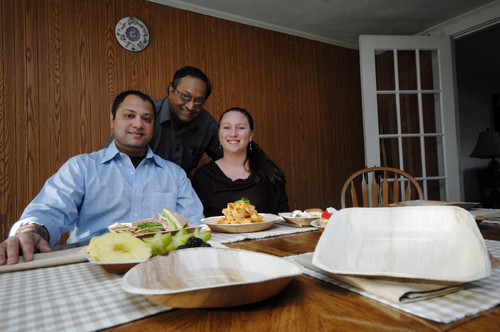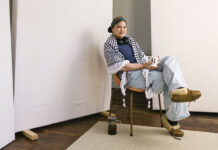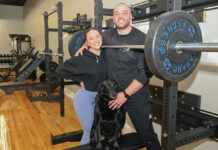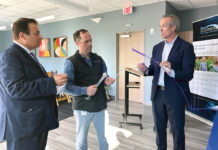
(Corrected, Dec. 19, 25)
Someday soon the hosts of a backyard cookout could clean up by ripping their disposable plates in half and tossing them into a garden compost pile. When guests return the next summer, they could be noshing on vegetables grown in the same material.
That’s the dream of three entrepreneurs who have formed Easy Island Inc., one of 56 competitors to present a quick description of their business plan at the Dec. 7 Rhode Island Elevator Pitch Contest. The partners, all employed as researchers at Women & Infants Hospital, hope to use the pressed leaves of areca nut palm trees to manufacture tableware that’s 100 percent biodegradable. The business would also help preserve natural landscapes in India, where the leaves are harvested.
“From your table, our product goes right back to the earth,” said Nishant Sharma, a partner in the venture and a student at the University of Rhode Island. “There’s no other product on the market like it.”
The Easy Island team, which won a $200 second prize in the competition, isn’t alone in its desire to help the environment while growing a business. Rhode Island’s latest crop of innovators unveiled through the contest want to help build wind turbines, erect green buildings and promote recycling. This year four of the nine winners were selling solutions to ecological problems.
The Elevator Pitch Contest – sponsored by Rhode Island businesses, colleges and nonprofits – gives competitors just 90 seconds to pitch their idea to a panel of judges, about the same amount of time they’d have should they bump into a potential investor in an elevator. It’s a lead-up to the annual Rhode Island Business Plan Competition held in April, an event established to promote entrepreneurship and job creation in the Ocean State.
This year’s sixth annual pitch contest, held at the Rhode Island Center for Innovation & Entrepreneurship, was a huge success, according to organizers. A panel of judges awarded a total of $1,000 in prizes to the top nine presenters. Pawtucket’s Kippkitts LLC took the $300 top prize in the contest with a proposal for a portable device that could be used by EMTs to reduce a person’s core body temperature after a heart attack or stroke.
As in years past, hopefuls talked up business plans involving high-tech communications, medical services, education, fashion and fitness. The recurring theme, though, was the number of innovators who see opportunity in going green.
The Easy Island team got its start when partner Satyan Kalkunte – an instructor of pediatrics research at Brown University’s Warren Alpert Medical School – told his friends how he’d seen plates made from areca leaves during a trip to his native India. Now the three co-founders hope to have a similar product in Providence stores this spring. While the plates will be manufactured in India, the company will have a marketing team in Rhode Island.
The company boasts that its product will be sturdier than paper plates, and strong enough to stand up to cutlery and hot liquids. Discarded plates can even be recycled as animal fodder. “No resins, dyes, strengthening agents or synthetic materials are used in the manufacturing process,” explained partner Kristen Legge, who is also a student at the URI.
New Jersey entrepreneur Daniel Russo – who hopes to launch his company in Rhode Island – was one of five third-place winners with his twist on the reusable shopping bag. Though such bags are currently a fashion hit, Russo saw a problem: according to his research, most shoppers forget them when they head for the store.
His solution: the Shopping List Bag, a canvas tote with a reusable shopping-list pad attached, as well as a pen, a clip for coupons, and a key holder for store loyalty cards. The whole thing can be folded to a hand-held size, and kept on the refrigerator with built-in magnets.
Selling ad space could boost company revenue, he notes. Brand logos can be printed on the bag, and the product can be sold with a pre-loaded coupon clip.
“Each operation would be tailored by necessity to the location and the corporate participant,” he said. “Instead of hiring a landscaper to clip the grass, you could have someone out there raising tomatoes. It’s a real win-win.”
Though locally grown food is currently a big hit at top restaurants and high-end supermarkets, Look says he’s motivated by something else. “Most of our food is transported hundreds or thousands of miles,” he said. “What happens when diesel rises to $10 a gallon, or truckers go on strike? You could walk into your supermarket and find nothing on the shelf.”
The judges took note of other green business plans as well. Brown student James McGinn was a third-place winner with a proposal to manufacture large but lightweight blades for wind turbines. The state already has the facilities to do the job, he said.
Providence resident Jeffrey Aghjayan took third-place as well, with a plan to plant vegetation on large rooftops to make buildings more energy efficient. That’s already being done in some locations, but he hopes to expand those efforts by creating roof gardens that weigh just a fraction of those currently in use.
Other green plans involved producing athletic wear from recycled material and packaging sports drinks in biodegradable bottles.
The contestants’ strong interest in green enterprises came as no surprise to Peggy Farrell, an attorney with Hinckley, Allen & Snyder LLP and a judge in the Business Plan Competition. “People have come to see sustainability as a pressing issue,” she said. “And innovators are looking for ways to combine social interests with their economic interests.” •
Correction to gender reference in 9th paragraph, as well as mispelling of Satyan Kalkunte’s name and his position at Brown.












